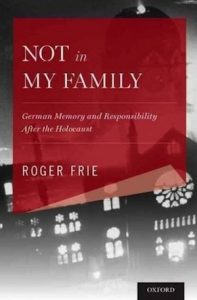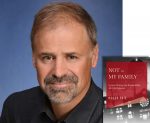Prof. Roger Frie’s Not in My Family rises above the merely personal (image from cenes.ubc.ca)
Forty-three years ago, at Vancouver’s first Holocaust Symposium, for which I was the chair, the keynote speaker was the Lithuanian partisan fighter Leon Kahn. His presentation to a large group of high school students described, among other things, how he watched, in hiding, while his mother and sisters were raped and murdered by members of the Einsatzgruppen – the murderous “task forces” mandated to kill Jews by gunshot (the so-called “Holocaust by bullets”) in German-occupied countries. Approximately two million Jews were murdered by the Einsatzgruppen.
After Leon was finished speaking, a tall, blond, blue-eyed boy walked slowly up to the podium. He was, he said, of German origin, and wanted to apologize to Leon. His face revealed how devastated he was. Leon shook his hand and told him, “Look, it wasn’t your fault. Now go on and live your life.”
That was my first experience with deutsche Schuld, German guilt.
There are literally hundreds of books and websites approaching deutsche Schuld from every angle. The author of Not in My Family: German Memory and Responsibility After the Holocaust (Oxford University Press, 2017) is Roger Frie, a Simon Fraser University professor and locally practising psychotherapist who is a third-generation German-Canadian. Based on his profession, he addresses the issue of German guilt in the present book from a personal psychological perspective, using his fear of being exposed as a “bad German,” along with his experience with inherited guilt, as his templates.
Frie’s Not in My Family was triggered, he says, by his mid-life discovery, long hidden by his family, of his beloved grandfather’s Nazi past. The book invites us to follow him as he slowly builds up the courage to go to the archives in Berlin to find the documentation revealing his grandfather’s Nazi membership and wartime activities.
“Opa” was hardly a high-ranking Nazi functionary, it turns out: he was “an ordinary German,” who operated, for all intents and purposes, as a minor motorcycle repairman. (Frie writes more about this apparently apolitical “motorcycle club” later in the book, but one is still left to wonder how the author, already heavily burdened with inherited guilt, would have felt if his Opa were discovered to have been say, a camp guard, or a member of the Totenkopfverbaende, the infamous Death’s Head Units.)
Ironically, Frie has professionally analyzed children of Jewish survivors, and some of his most intimate reflections arise from his wrestling, during these sessions, as to whether or not to reveal that he is himself of German heritage.
 Constantly throughout Not in My Family, Frie reiterates that he “has an obligation to remember the past” and, while remembering, he has many sincere reflections on post-Holocaust German guilt and responsibility, complicity, prejudice, cowardly denial and “shameful silence” of past issues, as well as, of course, the “need for redemption” and “the problematics of trauma,” especially of his own, rooted in a questionable notion of vicarious perpetration, three generations down the line.
Constantly throughout Not in My Family, Frie reiterates that he “has an obligation to remember the past” and, while remembering, he has many sincere reflections on post-Holocaust German guilt and responsibility, complicity, prejudice, cowardly denial and “shameful silence” of past issues, as well as, of course, the “need for redemption” and “the problematics of trauma,” especially of his own, rooted in a questionable notion of vicarious perpetration, three generations down the line.
On this last point, clearly, there was a therapeutic dimension for the writing of Not in My Family: it reflects on every page. But the book rises above the merely personal. For example, Frie is brutally honest in rejecting the moral camouflage of the “Germans suffered too” ilk, and on the need to be suspicious of Germans who feel “deluged” with the Holocaust.
Near the end of Not in My Family, Frie reflects that “writing can be a form of discovery, of examining life and making sense of the past.” This book, for him, he admits, was “personally meaningful” and “emotionally draining.” But if, as he puts it, the book “creates a space for dialogue and reflection on the nature of German memory and the Holocaust,” it is a valuable contribution to an ever-growing body of knowledge about how the greatest crime in human history came to be perpetrated by, among others, affectionate, family-loving, probably not dogmatically antisemitic, minor motorcycle repairmen.
Graham Forst, PhD, taught literature and philosophy at Capilano University until his retirement and now teaches in the continuing education department at Simon Fraser University. From 1975 to 2010, he co-chaired the symposium committee of the Vancouver Holocaust Education Centre.

